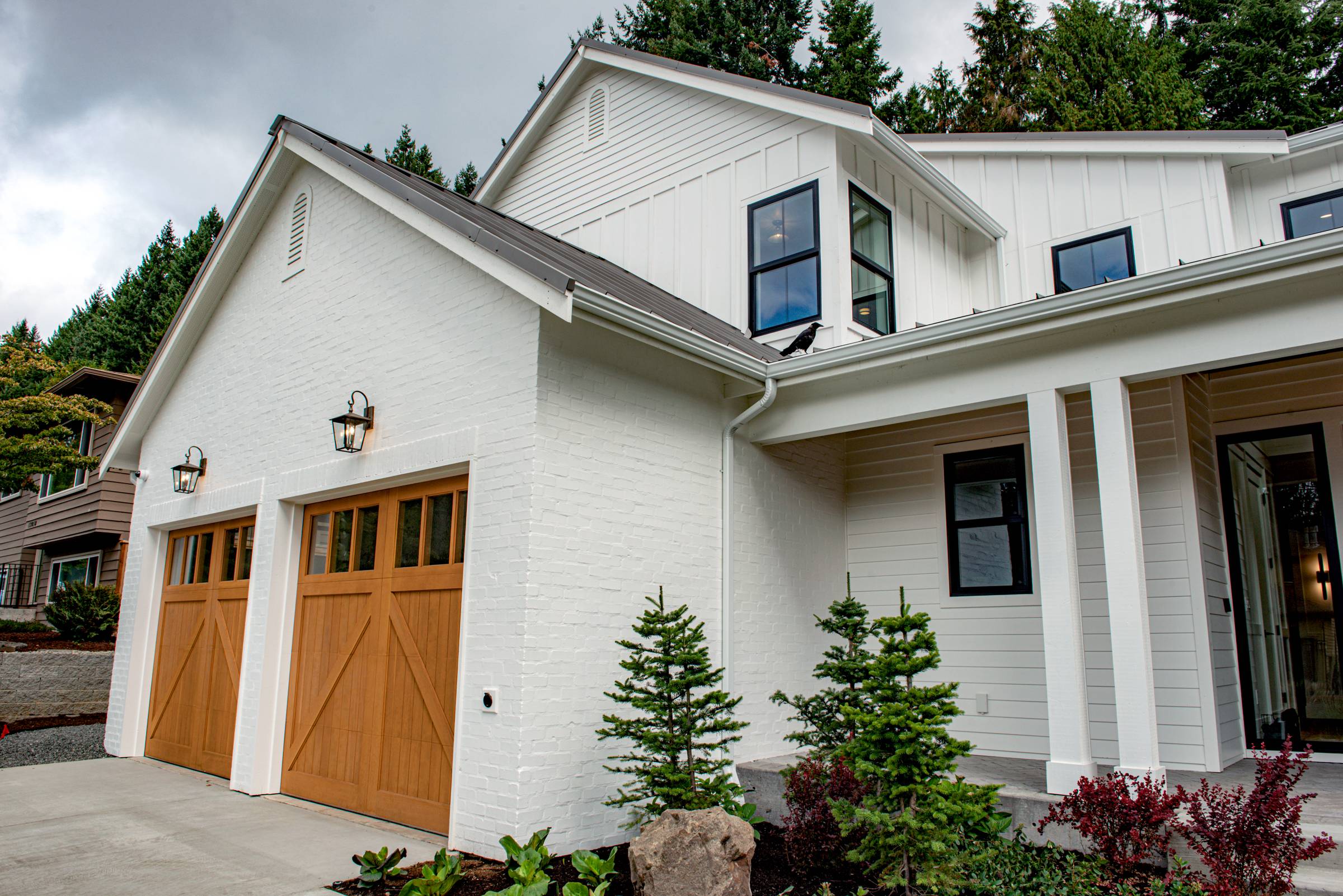
Brick can be a more durable option than vinyl siding if you are looking to upgrade your home. Brick is an excellent insulation material that can withstand extreme weather and fire resistance. Brick made from recycled material can also exist, making it eco-friendly as well as durable.
Brick isn’t just for rustic properties; it can be great on any property. This house is made up of a combination white clapboard and red brick above the foundation. The front door has small, red-brick wisps that frame it.
The vinyl siding must be removed before you can get started. You can hire a professional masonry contractor to help you if the job is too complicated. After you remove the siding, determine the amount of brick required. If you plan to replace the entire house, you'll need to budget around $7 to $15 per square foot of coverage. You might need more money for labor, depending upon the materials used.

No matter if you are replacing your vinyl siding by brick or another material, you will need new insulation and a waterproof barrier to stop moisture from getting through the windows and doors. If you're doing the installation yourself, you'll need to check the building codes for your area. Architects are available to help you plan the patterning of brick and give suggestions for the best way.
Mortar is also required to attach bricks to the wall. Choose a water-based adhesive for your adhesive choice. If you choose a stronger adhesive, it might cause brick damage instead of improving it. Regardless of the choice, you'll want to clean the brick surface with a suitable cleaning agent, such as bleach, to prevent the bleach from leaching into the brick.
Another useful brick trick is to use a polyurethane sealant to protect your new covering. It is durable and will hold up for many years so it can be a wise decision to use a polyurethane sealing agent. For help in deciding which product to buy, consult your local building department.
If you are doing the brick-to-vinyl siding job yourself, you'll need to determine the size of your house. You should choose a brick that is durable and can withstand the elements if you live in a warm climate. You might consider a different material if you live in a colder climate.

You should also make sure your gutters are clear. If they are stained, you may need to hire someone to clean them. Afterwards you can begin to inspect your siding and look for any pooling water or leaks.
FAQ
How can you remodel a house without spending any money?
The following steps should be taken when renovating a house without any money:
-
You should create a budget plan
-
Find out which materials you require
-
You must decide where to place them
-
Make a list.
-
Calculate how much money is available
-
Plan your renovation project
-
Start to work on your plans
-
Do some research online
-
Ask family and friends for their help
-
Get creative!
How Much Does It Cost To Renovate A House?
Cost of renovations depends on the material used, how large the job is and how complex it is. Some materials such as wood require additional tools like saws and drills while others like steel do not. The price of renovations depends on whether you hire a contractor to do the job or if you are willing to do the work yourself.
The average home improvement project cost is between $1,000 and $10,000. The average cost of home improvement projects would be between $5,000 and $25,000. You could also spend as much as $100,000 if you do it all yourself.
There are many factors that influence the final cost of renovations. They include the type of material used (e.g. These factors include whether brick is concrete or brick, how large the project is, how many workers are involved, the duration of the project and so on. You must always keep these factors in mind when estimating the total cost of renovation.
Can I rent a dumpster?
After completing a home renovation, you can rent an dumpster. Renting a dumpster to dispose of your trash is a great option.
How many times should I change my furnace's filter?
How often your family expects to use the heating system in their home will determine the answer. Consider changing your filter frequently if your family plans to leave the house during cold weather months. If you're not often out of your home, however, you may be more able to wait for the filter to change.
A furnace filter can last about three months. You should replace your furnace filters every three months.
You can also consult the manufacturer's recommendations regarding when to change your filters. Some manufacturers recommend that you replace your filter after every heating season. Others suggest waiting until there are visible dirt deposits.
Is it possible to live in a house that is being renovated?
Yes, you can live in your house while you renovate it.
Are you able to live in your house while the renovations are ongoing? The time taken to complete the work will impact the answer. If the renovation process takes less than 2 months, then your home can be lived in while it's being renovated. If the renovation takes longer than two weeks, however, you can't live in your home during the construction.
You should not live in your house while there is a major building project underway. This is because you could be injured or even killed by falling objects on the construction site. The heavy machinery and noise pollution at the job site can also cause dust and noise pollution.
This is especially true for multi-story houses. The vibrations and sounds that construction workers create can cause damage to your property and contents.
As we mentioned, temporary housing will be necessary while your home is being renovated. This means you won’t have the same amenities as your own home.
You won't be allowed to use your dryer or washing machine while they are being repaired. You will also have to put up with the smell of paint fumes and other chemicals as well as the loud banging sounds made by the workers.
All these things can lead to anxiety and stress in your family. You should plan ahead to avoid feeling overwhelmed by this situation.
Do your research before you begin renovating your home. You can avoid costly mistakes later.
It is also advisable to seek professional assistance from a reputable contractor so that you can ensure that everything goes smoothly.
Is it better to hire either a general or subcontractor?
It is more expensive to hire a general contractor than to subcontract. A general contractor often has many workers, which means they can charge their clients more for labor. A subcontractor on the other side only employs one person, so he/she charges less per-hour.
Statistics
- Rather, allot 10% to 15% for a contingency fund to pay for unexpected construction issues. (kiplinger.com)
- A final payment of, say, 5% to 10% will be due when the space is livable and usable (your contract probably will say "substantial completion"). (kiplinger.com)
- They'll usually lend up to 90% of your home's "as-completed" value, but no more than $424,100 in most locales or $636,150 in high-cost areas. (kiplinger.com)
- On jumbo loans of more than $636,150, you'll be able to borrow up to 80% of the home's completed value. (kiplinger.com)
- The average fixed rate for a home-equity loan was recently 5.27%, and the average variable rate for a HELOC was 5.49%, according to Bankrate.com. (kiplinger.com)
External Links
How To
How to Renovate an Old House
To begin with, I would suggest that you should first determine what type of renovation project you want to undertake. This could be anything from updating your kitchen appliances to completely renovating the house.
Once you have decided what type of renovations you want to undertake, the next step is to determine how much money it will cost. You may find that your funds are not sufficient to cover the whole project. If this is true, you will need to make hard decisions about which areas you can afford to fix and which ones you won't.
Before you start work on your renovations, there are a few things you should consider. The first thing to do is ensure you get the necessary permits. You should check whether you are required to have planning permission to perform certain types of work. You might have to apply for building permission if you want to add an extension to your home.
Before you begin any work on your home, check with your local council to make sure they don't require any permits. It is also important to check whether planning permission is required for every part of the house you are renovating. Finally, if you're carrying out any major works such as installing a new roof, you might need to contact your insurance provider to make sure that you have adequate cover in place.
Next, you will need to decide on the tools and materials that are best suited for your job. You have many options. It is important to carefully research all of them. You will use paint, wallpaper paste or flooring for your renovations.
Be sure to consider the product's quality when choosing these products. Quality products last longer than cheaper products and are less expensive. When you are buying any item, ensure that you only purchase what is necessary for the job. You shouldn't just buy too much because you might end up wasting valuable resources and having to throw away large amounts of material. Try to only buy what you actually need.
After choosing the right materials for the job you should decide where to keep them while you're renovating the property. You might need storage space if you are renovating large areas of your house. Another option is to ask friends and family to help you move the items.